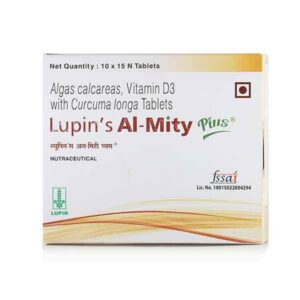VITAMIN D3 (CHOLECALCIFEROL) + TURMERIC (CURCUMA LONGA) + ALGAS CALCAREAS
Vitamin D3 (cholecalciferol): Vitamin D3, also known as cholecalciferol, is a form of vitamin D that is primarily synthesized in the skin when exposed to sunlight. It is also available as a dietary supplement and can be prescribed as a medication for certain conditions.
The main use of Vitamin D3 is to treat and prevent vitamin D deficiency. It plays a crucial role in maintaining bone health and aiding the body’s absorption of calcium and phosphorus. Additionally, vitamin D3 is involved in regulating the immune system, promoting cell growth, and reducing inflammation.
Vitamin D3 works by binding to vitamin D receptors in various tissues throughout the body. This interaction helps regulate the expression of genes involved in bone metabolism and immune function. It helps increase the absorption of calcium and phosphorus from the intestines and promotes their reabsorption by the kidneys, ultimately leading to improved bone mineralization.
The recommended dose of vitamin D3 varies depending on age, health condition, and the extent of deficiency. The dosages typically range from 400 to 2000 international units (IU) per day for adults. However, individuals with severe deficiencies may require higher doses as prescribed by a healthcare professional.
While vitamin D3 is generally considered safe, excessive levels can lead to toxicity. Common side effects of vitamin D3 supplementation can include nausea, vomiting, constipation, increased thirst, and frequent urination. In very high doses, it may cause hypercalcemia (high levels of calcium in the blood), which can lead to symptoms like muscle weakness, confusion, and kidney stones.
It is important to note that vitamin D3 supplements can interact with certain medications, such as corticosteroids, antacids, and cholesterol-lowering drugs. It is advisable to consult a healthcare professional before starting any new medication or supplement to ensure proper dosage and minimize the risk of adverse effects or drug interactions.
Turmeric (curcuma Longa): Turmeric, also known as Curcuma longa, is a spice that is commonly used in cooking. It has a long history of medicinal use in traditional Indian and Chinese medicine. The active compound in turmeric is called curcumin, which has been found to have various health benefits.
Turmeric is primarily used as a natural remedy for inflammatory conditions. It has been extensively studied for its anti-inflammatory and antioxidant properties. It is believed to work by blocking the action of certain enzymes, such as COX-2 and LOX, which are involved in the inflammation process. Turmeric also has a protective effect on the liver and has been studied for its potential anticancer properties.
The dose of turmeric can vary depending on the desired effect. As a spice, it is generally safe to consume in moderate amounts in cooking. However, for therapeutic purposes, higher doses in the form of supplements may be recommended. The typical dose of curcumin supplements ranges from 500 to 2000 milligrams per day, divided into multiple doses.
While turmeric is generally considered safe, it can cause some side effects, especially when taken in large amounts or over an extended period. These side effects may include stomach upset, diarrhea, nausea, and allergic reactions. Turmeric can also interact with certain medications, such as anticoagulants and antiplatelet drugs, which may increase the risk of bleeding.
It is important to note that turmeric supplements may not be well absorbed by the body when taken alone. To enhance absorption, it is often recommended to take turmeric with black pepper or a fat source, as they can improve its bioavailability.
As with any supplement or medication, it is always advisable to consult with a healthcare professional before starting turmeric or curcumin supplementation, especially if you have any existing medical conditions or are taking other medications. They can provide personalized guidance on the appropriate dose and potential interactions.
Algas Calcareas: Algas Calcareas, also known as Calcium Alga, is a pharmaceutical drug derived from marine algae. It is commonly used as a calcium supplement to help maintain proper bone health.
The mechanism of action of Algas Calcareas is primarily related to its high calcium content. Calcium is an essential mineral that plays a crucial role in various bodily functions, including bone formation and maintenance. Algas Calcareas provides a natural and organic source of calcium, making it easily absorbable by the body. It also contains other minerals like magnesium and trace elements, which further contribute to its beneficial effects.
The recommended dose of Algas Calcareas may vary depending on the individual’s age, sex, and specific dietary requirements. It is typically taken orally, usually with water or as directed by a healthcare professional. It is important to follow the prescribed dosage and duration to achieve the desired effect.
Though Algas Calcareas is generally well-tolerated, there are a few potential side effects to be aware of. These side effects may include gastrointestinal disturbances like constipation, bloating, or nausea. In rare cases, individuals may experience allergic reactions, characterized by rash, itching, or swelling. If any of these side effects occur or worsen, it is advisable to seek medical attention promptly.
Additionally, it is essential to note that Algas Calcareas should not be used as a sole treatment for severe calcium deficiencies or conditions requiring specialized medical intervention. It is important to consult with a healthcare professional before starting any new medication or supplement regimen.
In summary, Algas Calcareas is a calcium supplement derived from marine algae. Its primary use is to support bone health by providing an organic source of calcium that is easily absorbed by the body. While generally well-tolerated, potential side effects may include gastrointestinal disturbances and rare allergic reactions. It is vital to use Algas Calcareas as directed and seek medical advice when necessary.

